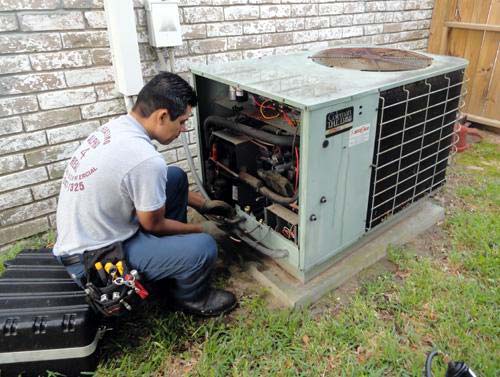It won’t be long before Summer is here. So, it’s a good time to turn our attention to air conditioning maintenance. It’s been months since you fired up the air conditioner, and the last thing you want is an unexpected failure when it’s hot outside.

If you’ve been on the fence about hiring a professional HVAC service, here are a number of benefits that can make the upfront expense worth it in the long run.
1. Improved Energy Efficiency
The number one reason to regularly clean and maintain your HVAC system is because it will lower the operating cost of the most power-hungry part of your home. The heating and cooling system accounts for roughly half of your annual energy expenses. Things like dirty condenser coils and blower components are only going to add to your utility bills.
Don’t let the age of the home fool you. Even if you buy a new home, the HVAC system can become less efficient within a year or two of use. That’s why annual servicing is so important.
HVAC systems that are properly maintained use 15% less energy. The improved energy efficiency is so substantial that the Small Business Administration (SBA) recommends that all businesses get seasonal tune-ups from a qualified professional. Beyond helping homeowners save more green, the improved efficiency will also significantly reduce greenhouse gas emissions produced by the home.
2. Increased Lifespan of the Equipment
Did you know that the average HVAC system has a lifespan of just 10-15 years? Many experts compare heating and cooling systems to cars. The better maintained it is, the longer it will keep running smoothly. You can definitely get more miles out of your HVAC system with annual servicing. With regular maintenance and upkeep, an HVAC system can easily last 20 years.
There’s also an additional eco benefit. HVAC systems require a lot of components and installing a new system creates a lot of waste. Every year that you extend the life of your HVAC system you’re decreasing your eco footprint.
3. Catch Problems Before They Get Expensive
HVAC problems don’t typically happen overnight. The EPA’s Guide to Energy-Efficient Heating and Cooling notes that proper HVAC maintenance from a trained technician is the most effective way to prevent future problems. Regular maintenance can also help homeowners catch small issues before they become big, expensive issues.
Many HVAC problems and failures can be attributed to two things: neglect and dirt. An HVAC technician can help you circumvent both of these costly issues. Remember, an ounce of prevention is worth a pound of cure.
4. HVAC Servicing Can Prevent Serious Safety Issues
Regular HVAC service can also catch serious problems before they become real safety concerns. For example, faulty electrical connections within the system could start a fire. Units that use gas for heating could also leak carbon monoxide if components are cracked or broken. Not to mention that a clean system will have a positive impact on the air quality in your home.
It’s easy to forget that the HVAC system is an industrial machine that can cause health risks if it isn’t operating properly. Professional servicing is worth the peace of mind knowing that heating and cooling your home is safe.
5. Constant Comfort
It happens to thousands of people every year. Their AC is humming along just fine, then without warning the system fails. They’re stuck in 90+ degree heat with no air conditioning. (The same scenario in winter can actually be dangerous.) Even worse is that HVAC technicians are booked solid since it’s summer.
To ensure your HVAC system is up and running when you need it most, ENERGY STAR recommends that homeowners have the heating system serviced in fall and the cooling system serviced in spring. Since these are the low seasons it will be easier to schedule, you may be able to find discount rates, and if there’s a problem it can be fixed before the system is really needed.



